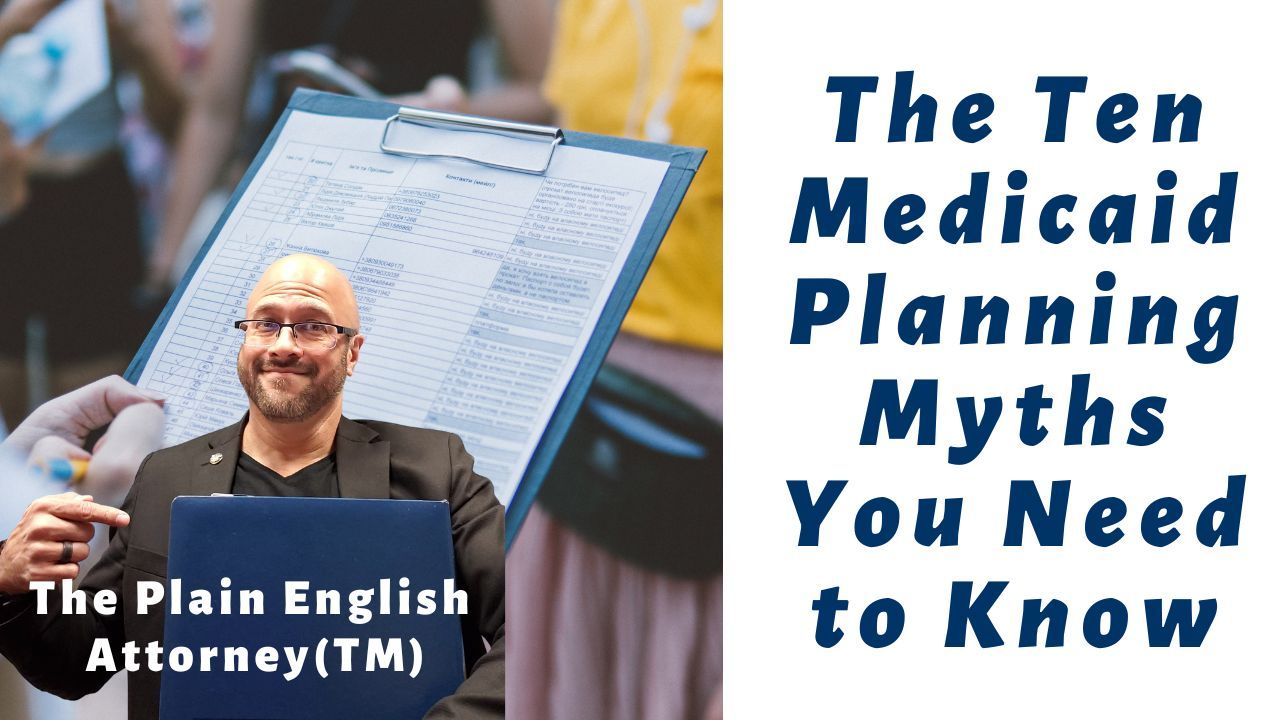The Ten Medicaid Planning Myths You Need to Know
Mar 27, 2023
It has been some time since I've covered Medicaid Myths in this blog, and some of these myths can be deadly to qualifying for Medicaid if followed through. Rather than start a list from scratch, I went straight to the source in my own book The Long Term Care Solution. Here is an excerpt from Chapter One.
---
10 Myths That Can Put Your Home and Savings at Risk
Myth 10. Medicare pays for all medical conditions, even ones lasting longer than 90 days. The fact is that Medicare is a type of primary health insurance for seniors that takes care of a limited amount of services for a limited period of time. It does not pay for all long term care needs.
Myth 9. Medicare Supplements pays for long term care. While the various Medicare supplements pay for things that regular Medicare doesn’t and can help defer out-of-pocket costs, it does not pay for long term care, which can be the most expensive cost to you and your family.
Myth 8. Primary Health Insurance pays for long term care. Just as Medicare will not pay for long term care, even with Medicare supplements, neither does privately paid health insurance handle long term care.
Myth 7. If you need long term care, you can just buy Long Term Care Insurance at that point. This is like saying you can always buy life insurance at a young age if you develop cancer. While it may actually be possible to find an insurance company to insure you, you better believe it will be astronomically expensive and you are better off getting it when you are healthy.
Myth 6. You can qualify for Care Assistance by giving your assets away just before you go into a nursing home. While there are certain Care Assistance benefits available to Veterans, their spouses, and widows/widowers, this is often for “non-skilled care” assisted living help. Simply giving all of your assets away can work if done more than five years before applying for Medicaid, but any sooner than that and you need a comprehensive Care Assistance Game Plan in place. And, no, there is no $15,000 a year per gifting exemption; that only relates to federal gift taxes and there is no similar exception for Medicaid.
Myth 5. A revocable living trust protects assets from a Medicaid Spend Down. While revocable living trusts are excellent estate planning tools and, in certain circumstances, can assist with a spend down for married couples, it does not simply exempt assets from a Medicaid spend down. In fact, it can even make otherwise exempt assets countable for Care Assistance purposes!
Myth 4. You can help qualify for Care Assistance by signing over your house to your kids. While there are many strategies that may include gifting assets, and even the house, to children, it is often the biggest and most financially crippling move you can make. Unfortunately, it is also one of the most frequent moves made by a family gripped by “nursing home panic” because they feel the need to do something, and there is no shortage of real estate attorneys who can draft a deed very inexpensively. And the good real estate attorneys (rightly) have waivers in their engagement letters absolving them from any liability.
Myth 3. There’s no need for a health care power of attorney or living will because the family knows what you want. While this is also universally a good idea for estate and health planning purposes, it becomes all the more critical when long term care is involved. Having the right people in place at the right time to make health care decisions when you can’t makes all the difference in the world. And having your end of life decisions regarding life support, artificial nutrition and hydration in a legally binding document means that your family doesn’t have to guess or have the burden of such a monumental decision.
Myth 2. Having a fill-in financial power of attorney from the office supply store or from a website is good enough. It isn’t. There are very specific gifting provisions, particular financial powers, and Care Assistance language that should be incorporated into financial power of attorney documents that relate to Care Assistance Planning. In fact, most estate planning attorneys do not have these provisions in their standard documents which may otherwise be very comprehensive.
Myth 1. There’s no need for a comprehensive Care Assistance Game Plan… my friend/neighbor/barista just did “X” and everything turned out OK. There are more than 200,000 regulations surrounding the Medicaid portion of Care Assistance Planning (let alone other Care Assistance programs) and there are just as many combinations of strategies and techniques that can be used depending on you and your family’s unique situation. It is a huge mistake to think that everything will be clear because you think you understand 3 pieces of a 200,000 piece puzzle. It’s always best to have a comprehensive Care Assistance Game Plan in place before taking any actions.
---
Check out the full book The Long Term Care Solution: The Truth Behind Today's Long Term Care Planning Explained in Plain English on Amazon by clicking here.
Stay connected with news and updates!
Join our mailing list to receive the latest news and updates from our team.
Don't worry, your information will not be shared.
We hate SPAM. We will never sell your information, for any reason.
